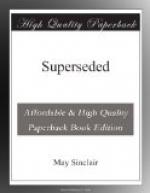They had risen, and her gaze left everything else to follow them; or rather, it went to meet them, for they had turned and were coming slowly eastward now. They had stopped; they were facing each other, and her gaze rested with them, fascinated yet uncertain. And now she could see nothing else; the park, with the regions beyond it and the sky above it, had become merely a setting for one man and one woman; the avenue, fresh strewn with red golden gravel, led up to them and ended there at their feet; a young poplar trembled in the wind and shook its silver green fans above them in delicate confusion. The next minute a light went up in that obscure and prophetic background of her brain; and she saw Rhoda Vivian and Bastian Cautley coming towards her, greeting her, with their kind faces shining.
She rose, turned from them, and went slowly home.
It was the last rent in the veil of illusion that Rhoda had spun so well. Up till then Miss Quincey had seen only half the truth. Now she had seen the whole, with all that Rhoda had disguised and kept hidden from her; the truth that kills or cures.
Miss Quincey did not go out again that day, but sat all afternoon silent in her chair. Towards evening she became talkative and stayed up later than had been her wont since she recovered her freedom. She seemed to be trying to make up to her aunt for a want of sociability in the past.
At eleven she got up and stood before the Old Lady in the attitude of a penitent. Apparently she had been seized with a mysterious impulse of confession.
“Aunt,” she said, “there’s something I want to say to you.”
She paused, casting about in her mind for the sins she had committed. They were three in all.
“I am afraid I have been very extravagant”—she was thinking of the blouse—“and—and very foolish”—she was thinking of Bastian Cautley—“and very selfish”—she was thinking of her momentary desire to die.
“Juliana, if you’re worrying about that money”—the Old Lady was thinking of nothing else—“don’t. I’ve plenty for us both. As long as we can keep together I don’t care what I eat, nor what I drink, nor what I put on my poor back. And if the worst comes to the worst I’ll sell the furniture.”
It seemed to Miss Quincey that she had never known her aunt in all those five-and-twenty years; never known her until this minute. For perhaps, after all, being angry with Juliana was only Mrs. Moon’s way of being sorry for her. But how was Juliana to know that?




